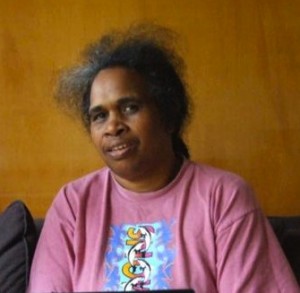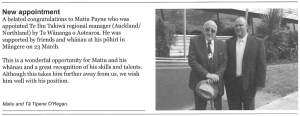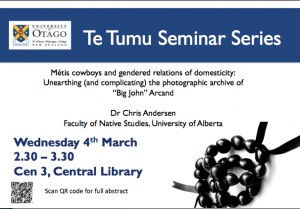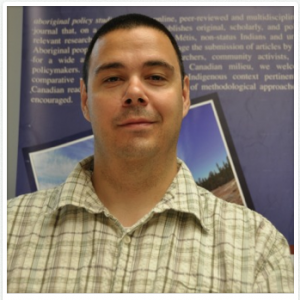Congratulations to Nathan Matthews
He mihi nunui ki a Nathan Matthews, e piki haere ana ki te ara mātauranga. Congratulations to Nathan Matthews in his new role at Te Whare Wānanga o Awananuiārangi. Nathan completed his undergraduate and postgraduate studies in Māori Studies in Te Tumu, completing his PhD in 2006. He also taught te reo Māori and Māori performing arts in Te Tumu for a number of years. In 2009 Nathan moved to Massey University to take up the role of Māori doctoral studies coordinator, later shifting to Whangārei as the founding principal of Te Kura Hourua O Whangarei Terenga Paraoa, a partnership secondary school. It’s great to hear that our former colleague and alumni of Te Tumu is heading back to the tertiary sector as Head of the School of Indigenous Graduate Studies at Te Whare Wānanga o Awanuiārangi.
Graduating this week
 Congratulations to Lois Kusilifu (Solomon Islands) who is graduating this week with a Master of Indigenous Studies degree.
Congratulations to Lois Kusilifu (Solomon Islands) who is graduating this week with a Master of Indigenous Studies degree.
Title: The Experiences of the Solomon Islands Seasonal Workers under the Recognised Seasonal Employer scheme in New Zealand
Supervisor: Dr.Alumita Durutalo
Abstract: “Oketa chalens na osem, pipol lo dea oketa laef stael differen, espeseli na swea. Ani smol samting swea.Iumi wea garem kastom,kaen ia barava nogud lo iumi. Sapos iu no doim eniting gud oketa swea lo iu nao, so hem na osem mi faesim. Hem nogud tumas lo mi taem mi herem oketa usim nem blo God mi fil nogud tumas. Nara samting moa,mifala waka anda nit presa. Mifala bae no rest, taem,taem, everiting mas in taem. Osem gogo mifala big woman gogo osem smol pikinini tu becos mifala waka anda presa. Ma samting mi saenem na ia. Osem sapos oketa lelebet meanim wei blo iumi bae gud(9WW).”
(The challenges I have come across is that the lifestyle is different. Especially the way swearing and blasphemy are a common everyday speech. Not only that, we work under pressure. We don’t rest for long. We are expected to do things on time. This makes us feel as if we are kids. If only they understood us)
This study focuses on e focus the experiences of the Solomon Islands seasonal migrant workers in New Zealand’s Recognised Seasonal Employer (RSE) scheme. This scheme enables low-skilled seasonal migrant workers, to work temporarily in New Zealand’s horticulture and viticulture industries for a period of three to seven months each year. Interviews were conducted in two different locations- Wairarapa, New Zealand and Honiara- Solomon Islands. Qualitative research methods were used in gathering primary and secondary information. The findings of the research suggest that Solomon Islanders have benefited from participating in the scheme in ways they expressed as in building of permanent homes, advanced payment of school fees and undertaking of small businesses.
This study focused on extending the boundaries of earlier research, such as that done on Ni-Vanuatu seasonal workers in New Zealand, by having an in-depth focus on the social experiences of the Solomon Islands seasonal workers in New Zealand. What were the social experiences of the Solomon Islands seasonal workers and what could be done to improve employer and employee relations through policies to enable the benefit of all, the employers, employees and the countries involved.
Te Tumu Research Roundup
Te Tumu staff have been active with research in the first half of the year. The highlights (listed below) show the depth and diversity of the research undertaken at the School.
In April Te Tumu hosted a three-day conference, Te Kura Roa: Minority Language & Dialect Conference, that attracted a number of speakers, from within New Zealand, as well as from USA, Tahiti, Australia, Scotland and Israel. Poia Rewi was the driving force behind this conference, a collaboration between the University of Otago, Victoria University and Ngā Pae o te Māramatanga. Suzanne Duncan was the key organiser, ably assisted by a number of students.
In May Te Tumu celebrated its 25th Anniversary, in conjunction with the Māori Centre’s anniversary. Events were organised by a committee headed by Karyn Paringatai and Suzanne Duncan. Of particular note was a one-day symposium at which a number of Te Tumu alumni presented on where their university educations had taken them.
In July, the book “The Lives of Colonial Objects” was published by Otago University Press, comprising a number of short essays on particular objects. Four Te Tumu staff contributed chapters: Megan Pōtiki on a tokotoko held by her whānau; Paerau Warbrick on a Māori Land Court Minute Book; Pāora Tapsell on the Te Haupapa cannon at Maketū; and Lachy Paterson on a press used to print a Māori-language newspaper in the 1860s. Also in this volume is a chapter by Michael Stevens, a former Te Tumu post-doc, on his whānau’s kahukiwi.
Pāora Tapsell, Poia Rewi and Tangiwai Rewi were on Research and Study Leave in Semester 1, with Matiu Ratima, Jim Williams and Michael Reilly away for Semester 2. Pāora Tapsell has recently returned from Vienna, having given a keynote address “Waka Wairua: Imagining an Other way of knowing our Pacific” at the New Zealand Studies Association conference. Matiu Rātima was awarded the Fulbright-Nga Pae O Te Maramatanga Scholar Award; this allows him to spend time at the University of Hawai’i to observe the teaching of Hawaiian languages.
In May, Megan Pōtiki published an article in the New Zealand Journal of History, 49, 1 (2015) on the Māori-language writings of H.K. Taiaroa and Tame Parata, and in June presented at a paper at the 4th International Conference on Language, Literature and Linguistics in Singapore on the use of old manuscripts as a means of revitalizing Kāi Tahu reo. Megan is writing this up for publication at present.
In February, Lachy Paterson gave a Waitangi Day at the Dunedin Art Gallery on past, present and future perceptions of the Treaty of Waitangi. As he didn’t have any teaching duties in Semester 1 he was able to travel to Canada in February/March where he gave a number of talks at the University of Alberta and University of Manitoba on ‘Indigenous Literacy and Literacy Practices: Māori in the 19th Century’ and (with Angela Wanhalla) ‘Indigenous Women, Writing and Colonialism’. In April he presented at a conference on colonial print media at the University of Cambridge, UK.
In June Jenny Bryant-Tokalau presented a paper entitled ‘New Communities and the State in Suva, Fiji’ to the Urban Melanesia theme at the European Society for Oceanistes Conference (ESFO), in Brussels. The paper will be published in a special edition of the Journal de la Société des Océanistes in 2016.
Tangiwai Rewi has recently published an article in the Journal of the Polynesian Society, 124, 1 (2015) on ‘The Ngāruawāhia Tūrangawaewae Regatta: Today’s Reflections on the Past’. Click here to access.
In February, Michelle Schaaf presented on ‘The role of family in Pacific migrant participation in physical activity and sport’ at the Inaugural International Conference on Migration Social Disadvantage and Health, in Melbourne.
Merata Kawharu and Karyn Paringatai both spoke at at Hui Poutama 2015: Māori Research Sympoisum in May. Hui Poutama is the University of Ōtāgo’s biennial symposium of Māori research. Karyn’s talk was on ‘The value of the dark: The students’ perspective’, and Merata Kawharu’s on ‘Entrepreneurship: the relevance of a customary context. A Ngāti Whātua narrative’.
Karyn Paringatai‘s research on teaching in the dark is in demand. She presented at a recent Pecha Kucha event at the Dunedin Public Art Gallery, and in July gave a keynote presentation at the Tuia Te Ako hui at Lincoln University.
Lyn Carter has two works in press: ‘Climate Change and Aotearoa New Zealand: A review’, a journal article with Wiley Interdisciplinary Review (LSE); and ‘Iwi are where the People are: Rethinking Ahi Kā and Ahi Matao in Contemporary Māori Society’ in the forthcoming Huia Publishers book, Home. Here to Stay!
Finally, Te Tumu is revamping its MAOR 102 textbook. The old book, Ki te Whaiao: An Introduction to Māori Culture and Society was published in 2004, and while it had served its purpose well, staff felt that a new volume was necessary. As with Ki te Whaiao, Te Tumu staff are doing most of the writing for this new book.
Career Advancement for Te Tumu Graduate
A belated congratulations also from Te Tumu to Matiu Payne who is now Te Ihu Takiwā Regional Manager for Te Wānanga o Aotearoa. Matiu completed his Master of Indigenous Studies at Te Tumu, and is currently undertaking PhD study with us on Ngāti Mutunga and the Native Land Court.
Upcoming Te Tumu Seminar
By Professor Chris Andersen (Faculty of Native Studies, University of Alberta).
This seminar will be followed by tea and coffee on Level 1, Te Tumu.
Public Lecture: “Scots and Indigenous Peoples in the Australian Colonies”
This might be of interest to some: Professor Ann Curthoys, a leading Australian historian who specialises in indigenous-settler interactions and relations, is giving a free public lecture entitled “Scots and Indigenous Peoples in the Australian Colonies” on Monday 24 November in Castle Lecture Theatre 1 at 3.30pm. Click here for full abstract and details.




